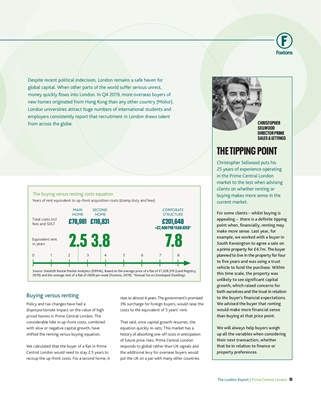
CHRISTOPHER
SELLWOOD
DIRECTOR PRIME
SALES & LETTINGS
Despite recent political indecision, London remains a safe haven for
global capital. When other parts of the world suffer serious unrest,
money quickly flows into London. In Q4 2019, more overseas buyers of
new homes originated from Hong Kong than any other country (Molior).
London universities attract huge numbers of international students and
employers consistently report that recruitment in London draws talent
from across the globe.
Buying versus renting
Policy and tax changes have had a
disproportionate impact on the value of high
priced homes in Prime Central London. The
considerable hike in up-front costs, combined
with slow or negative capital growth, have
shifted the renting versus buying equation.
We calculated that the buyer of a flat in Prime
Central London would need to stay 2.5 years to
recoup the up-front costs. For a second home, it
rises to almost 4 years. The government's promised
3% surcharge for foreign buyers, would raise the
costs to the equivalent of 5 years' rent.
That said, once capital growth resumes, the
equation quickly re-sets. This market has a
history of absorbing one-off costs in anticipation
of future price rises. Prime Central London
responds to global rather than UK signals and
the additional levy for overseas buyers would
put the UK on a par with many other countries.
The buying versus renting costs equation
Dataloft Rental Market Analytics (DRMA), Based on the average price of a flat of £1,328,319 (Land Registry, 2019)
and the average rent of a flat of £608 per week (Foxtons, 2019). *Annual Tax on Enveloped Dwellings
Equivalent rent
in years
0 4
2 6
1 5
3 7 8
Total costs incl
fees and SDLT
Years of rent equivalent to up-front acquisition costs (stamp duty and fees)
£78,981
2.5 3.8 7.8
£118,831 £201,648
+£7,400 PER YEAR ATED*
MAIN
HOME
SECOND
HOME
CORPORATE
STRUCTURE
THE TIPPING POINT
Christopher Sellwood puts his
25 years of experience operating
in the Prime Central London
market to the test when advising
clients on whether renting or
buying makes more sense in the
current market.
For some clients - whilst buying is
appealing - there is a definite tipping
point when, financially, renting may
make more sense. Last year, for
example, we worked with a buyer in
South Kensington to agree a sale on
a prime property for £4.7m. The buyer
planned to live in the property for four
to five years and was using a trust
vehicle to fund the purchase. Within
this time scale, the property was
unlikely to see significant capital
growth, which raised concerns for
both ourselves and the trust in relation
to the buyer's financial expectations.
We advised the buyer that renting
would make more financial sense
than buying at that price point.
We will always help buyers weigh
up all the variables when considering
their next transaction, whether
that be in relation to finance or
property preferences.
Source: Dataloft Rental Market Analytics (DRMA), Based on the average price of a flat of £1,328,319 (Land Registry,
2019) and the average rent of a flat of £608 per week (Foxtons, 2019). *Annual Tax on Enveloped Dwellings
The London Report | Prime Central London 19